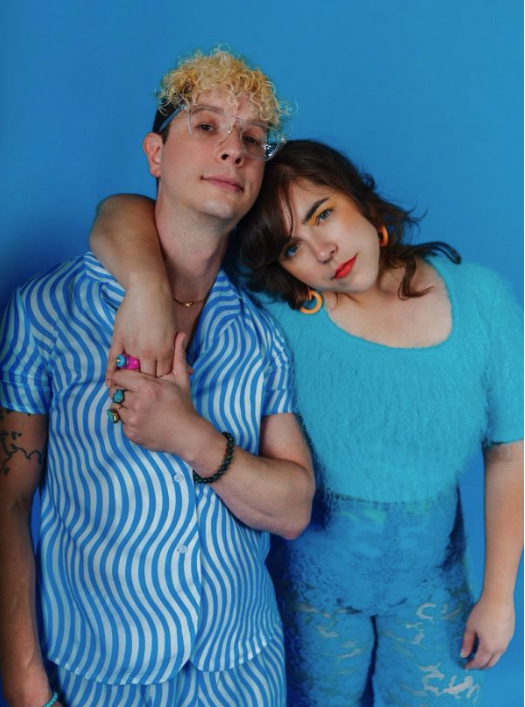The Ting Tings Wreck Their Lives

The British dance rock band finds discomfort to be a valuable part of their creative process.
Jules De Martino of The Ting Tings wants people to know that they’re a real band, not the creation of the pop machinery. “Everybody thinks that it was this attempt to be a manufactured pop band to make some money, but it wasn’t,” he says, “it” being their signature hit, “That’s Not My Name.”
“It was us having a fucking good ol’ moan about how things are.”
De Martino told me that, just as he has told many journalists who have interviewed her since the band’s most recent album, Super Critical, was released last summer. The Manchester-based pop band has had the sort of career arc that would cause many to jump to the conclusion that the band was invented, not discovered. In 2007, they emerged seemingly from nowhere with an independent single, “Great DJ” backed with “That’s Not My Name,” and when those songs were released internationally in 2008 after the band signed to Sony Records, they blew up, particularly “That’s Not My Name.”
The spare, cheerleader-like rock energy of The Ting Tings’ dance pop felt fresh and a little novel, which contributed to suspicions about the band. When the duo of De Martino and Katie White followed up their debut album, We Started Nothing in 2012 with the less convincing and less successful Sounds from Nowheresville, the easy narrative was that they were pop flashes in the pan, soon to be the answer to a trivia question. Someone whose band name would be the butt of weak jokes when VH-1 shoots I Love the 2000s.
The Ting Tings will play One Eyed Jacks Monday night, and the story had an additional layer. They had recorded a number of songs for Sounds from Nowheresville in Berlin that label reps thought had a lot of potential, but The Ting Tings scrapped those songs and replaced them with ones that they felt more comfortable with but didn’t perform as well on the charts. That fed the idea that White and De Martino were flighty at best, difficult at worst.
Not surprisingly, The Ting Tings see the story that led to Super Critical differently.
“To keep us on our toes, we wreck our lives a bit,” White says. Unlike De Martino, who talks in paragraphs and covers the talking points en route to an energetic answer to a question, White has a lead singer's disarming charm and apparent guilelessness, even when she stays on message as well.
"We were squashed in this windowless studio," she says of the recording process for Super Critical in Ibiza. "It was charming, but it’s not like you’re stuck on a boat at the beach each day and trying to write songs because we know that’s never going to work. You’re going to write shitty songs. If you get too comfortable and too domesticated, it’s very easy to go into a nice environment, especially if you’ve had a record that has been a success and you can buy yourself a nice little house. We’re all to aware that if we went down that path, we probably wouldn’t make any more albums.”
She hears the connection between We Started Nothing and Super Critical. Both are carefree, she says, but We Started Nothing had an undercurrent of anger at the casually shabby treatment that would bubble up and dominate Songs from Nowheresville. New York City clubs and bands in the 1970s—a time where Blondie and Chic could be played by the same DJ--inspired Super Critical. A very convincing approximation of Nile Rodgers' guitar style powers "Do It Again" and “Wrong Club,” the first single, which could keep the dance floor moving after Daft Punk’s “Get Lucky.”
That sensibility evolved while White and De Martino were at dance music mecca Ibiza, where they had gone to record an album. Leaving Manchester to new locales is crucial to the band’s process, White says. “We know if we put ourselves in a new situation—that feeling of being like a new band—that something generally happens,” she says. “Whether it’s good or bad, something generally happens.”
They thought they’d be influenced by EDM and the DJs and Ibiza, but that wasn’t the case. “We’re hanging out in Ibiza getting off our faces in clubs, and everybody’s got their hands in the air at 128 bpms, and no one can really dance,” De Martino says. “No one dresses up, it’s not cool, there’re no good drinks and no good chat. Unless you’re spaced out on acid or whatever you’re taking, it’s really not a great place anymore.”
They had parted ways with their manager and Sony, and there were some drunken nights when they wondered what they were doing, but De Martino agrees that taking a chance is part of The Ting Tings’ process. “We feel stumbling across an ethic and a reason to make a record is the right way to do stuff,” he says.
While in Ibiza, they lucked into Duran Duran member Andy Taylor, who heard them rehearsing and stopped to look in. They were working out demos but hadn’t started to record seriously, and in that semi-casual atmosphere they struck up a friendship with Taylor. He understood them as someone who’d played dance rock himself, and he was supportive at a time when they could use a friend.
“The second album is us bitching about the music industry,” White says. Sony was accustomed to building pop stars by making them celebrities, encouraging them to do red carpet events and attend high profile parties. Neither idea excited White and De Martino, but not because they were against success or parties or events like that, White insists. “We do it really badly, and we don’t enjoy it.”
They developed a relationship with Taylor over a course of months before approaching him to produce the album. He agreed, and they recorded the songs for Super Critical in Ibiza, then went to New York City for six weeks to do overdubs, new vocals, and mixing at Avatar Studios with Taylor. There, they worked to analog tape, and the experience added a social dimension to music-making that De Martino had never experienced.
“You’d have a little pressure, and you’d have a smoke and a beer, and there would be a little bit of banter in the studio coming through your headphones, and you know that everybody’s waiting for you to get this jam or groove right,” he says, getting a little breathless as he sets the scene in the studio. “And when you come out, everybody’s like Whooo! Fucking hell. That beats sitting in your bloody bedroom putting something down and saying, That’ll do.”
At the moment, The Ting Tings are talking about relocating to Nashville to record their next album--something White says is also part of their process. “What we generally do is go somewhere new and fall in love with it and picture what it’s like to live there and how we will be able to be creative there. But we do that for every single place we go. We go to Tokyo and think, We’ve got to move here. It’s the only place we can be. When we leave, we’ll go some place in Italy and say, Oh my god, this is the place! We get bored very easily.
“We have a huge fear of day-to-day life. The second we feel like we’re going into normality, we generally pack up our things and leave. It always feels like the right thing to do.”






